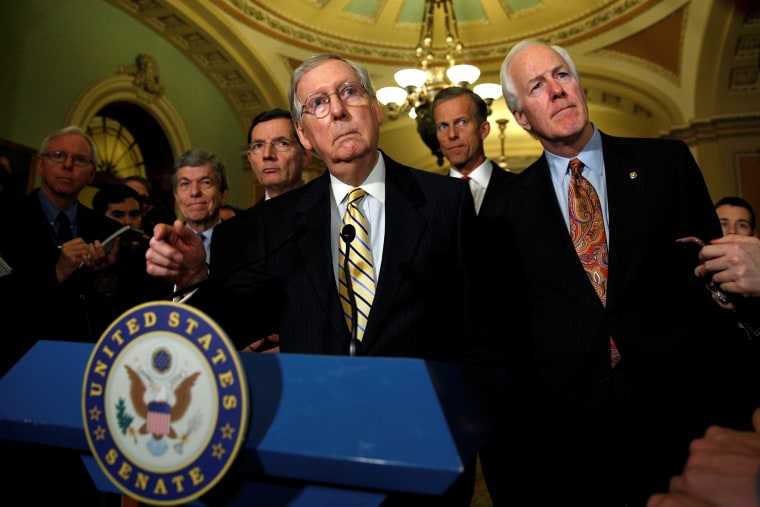The Washington Post published a memorable front-page piece after Sens. Jeff Flake (R-Ariz.) and Bob Corker (R-Tenn.) condemned Donald Trump in unusually personal terms. The senators "sounded an alarm," the article said, about the president's fitness for office and "warned that his actions were degrading and dangerous to the country."
This was, the Post added, "an extraordinary breach that threatens his legislative agenda and further escalates the civil war tearing apart the Republican Party."
The article ran on Oct. 25 -- not quite two months ago.
At the time, talk of a GOP "civil war" was quite common. Politico used the same phrase that week – twice. (On "The Late Show," CBS's Stephen Colbert joked the strife within the Republican Party is "like a new civil war, only this time, neither side is trying to help black people.")
I think we've discovered their peace treaty.
The Senate voted along party lines after midnight Tuesday to pass a sweeping $1.5 trillion tax bill that slashes tax rates for corporations, provides new breaks for private businesses and reorganizes the individual tax code.
The final vote was 51 to 48, with every Senate Democratic voting against it, and every Senate Republican voting for it. The exception was Sen. John McCain (R-Ariz.), who missed the vote for health reasons, but who nevertheless endorsed the far-right tax package.
The bill will now head back to the House, which thought it had passed the bill yesterday afternoon, but which will have to vote again today for procedural reasons. (The two versions have to be identical, and the parliamentarian rejected a pair of measures from the bill before the Senate vote.)
Passage, however, is assured. The House easily passed the partisan plan yesterday, and there's nothing to suggest 10 House Republicans will change their mind by this afternoon.
And just like that, talk of a GOP "civil war" evaporates into the ether. It's worth appreciating why.
As we discussed in October, this was always one of those odd civil wars in which both sides agreed with one another. Sure, plenty of Republicans -- including, but not limited to, high-profile senators and the most recent GOP president -- have grown disgusted by Trump's ridiculous antics, and were probably sincere when they expressed concerns about the threats he poses to democracy.
But on a fundamental level, their differences were stylistic. Even at the time, when Jeff Flake was condemning his party's president, there was a broad understanding among Republicans that the Arizonan would support the GOP tax plan -- which he did -- no matter what he thought of Trump.
Because when push comes to shove, not only was the party's civil war superficial, it masked the core truth that Republicans are united in their commitment to redistributing wealth from the bottom up, giving more to Americans at the top, to the detriment of everyone else. Their belief in trickle-down economics is practically religious, and it binds the party in ways Trump can't break.
As Rep. Tom Cole (R-Okla.) put it yesterday, "God made Republicans to cut taxes."
Those looking to the GOP's "Never Trump" faction to help derail the White House's agenda misunderstood the nature of their criticisms. Republicans like Flake and Corker haven't been comfortable with the president's tone. They've long seem him as some kind of offensive buffoon, incapable of leading a great nation. But they're still Republicans in good standing, serving in a radicalized political party that didn't think twice about passing a woefully unpopular tax plan that's stacked heavily in favor of the wealthy, which undermines the health care system tens of millions of Americans rely on, and which exacerbates the gap between rich and poor.
Trump's GOP detractors abhor the president for reasons that have very little to do with the White House's policy agenda. It's why practically every Republican in Congress was eager to link arms with their GOP brethren and pull off one of the most dramatic heists in modern history -- not because their president led them to this outcome, but because these are the policies they're genuinely eager to impose on Americans.
Donald Trump and his intra-party critics don't have to agree on niceties such as tone and demeanor. They found they can end their "war" by putting as many resources as possible into the hands of those who already have the most. It's what defines the modern Republican Party in ways the president can't and won't change.
